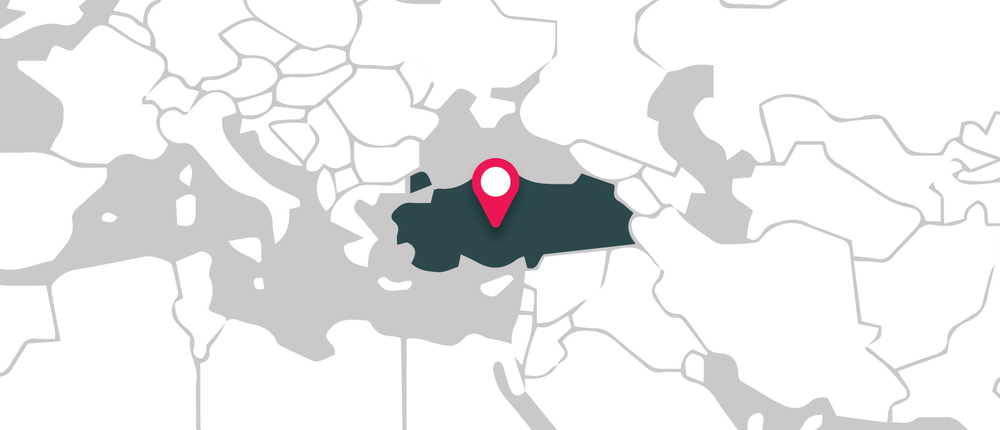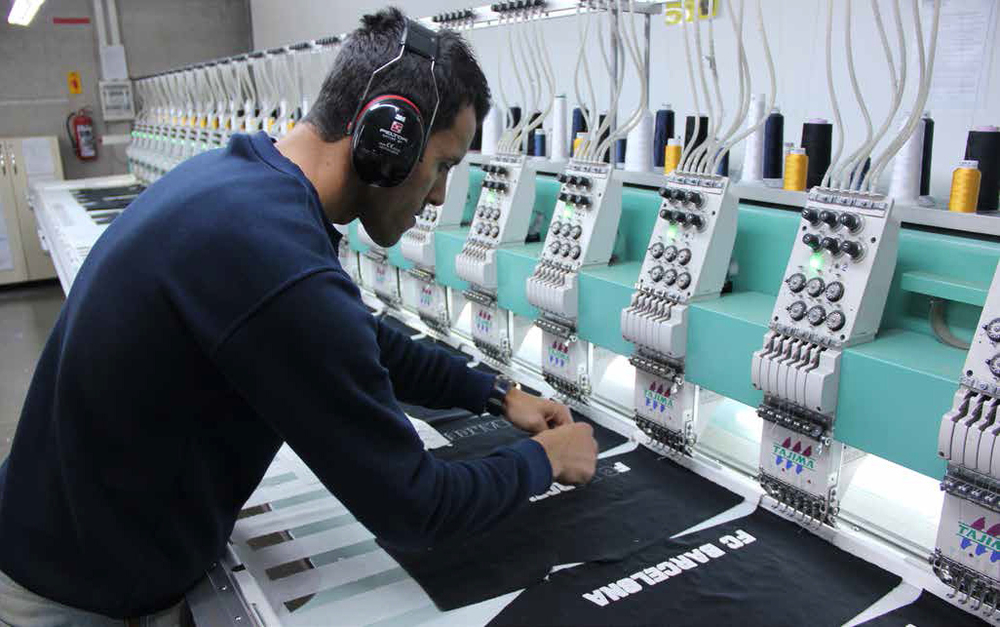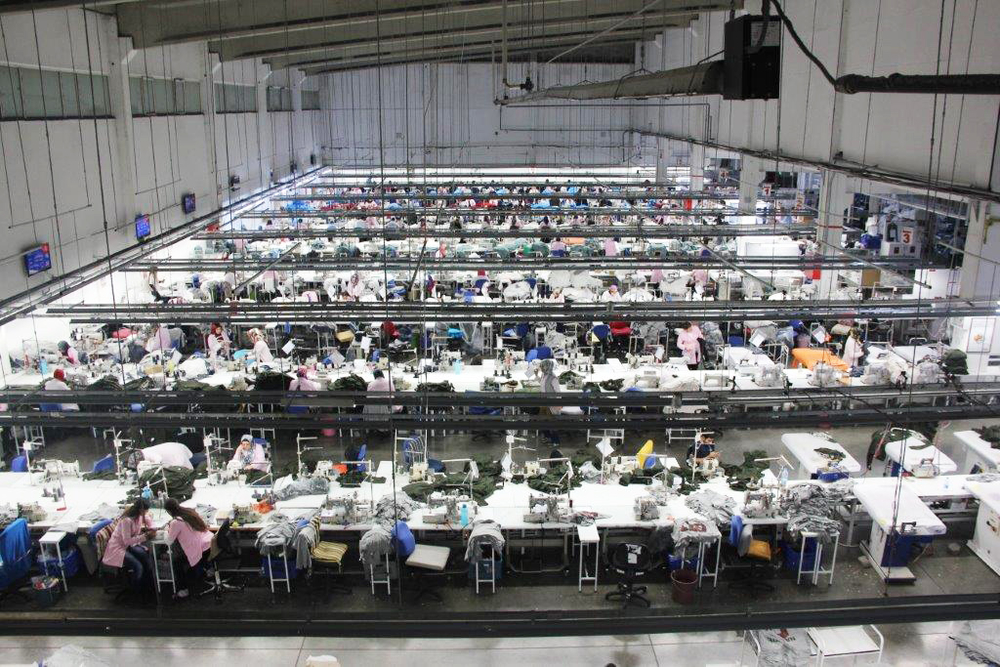Turkey /
Navigating a complex apparel supply chain and a changing labour market
People involved in this case story:
For one Turkish apparel company, respecting human rights in the supply chain begins with tracing where its products come from.

Note: This story captures experiences and opinions from various perspectives on a particular situation, and is designed to share lessons learned on some of the issues involved. It is not intended to be a comprehensive case study nor does it claim to give a definitive account of a specific case or perspectives on that case.
—
If you look down at the clothes you are currently wearing, what do you see? Woven cloth. Coloured fabric. Buttons. Zippers. The seams and stitching. And you remember the store where you bought the garment – how it was labelled and packaged – and perhaps you wonder how it got to the store in the first place.
And if you go a step further, and ask how many people were involved in the making of that garment – it’s potentially hundreds of people. And how can a company ever know whether or not those people’s human rights were respected in the process of making that one pair of jeans, or one shirt?
"Traceability is the no. 1 challenge for us when it comes to sustainability and respecting human rights," says Göktuğ Ünder, Social Compliance Director at Turkish apparel company DeFacto.
Where do our products come from?
As Ünder describes, DeFacto’s motivation to work to ensure their business – including its supply chain – respects people’s human rights was triggered by the 2013 Rana Plaza disaster in Bangladesh.
While Turkey is a major apparel producing country itself, "Bangladesh is one of our key sourcing countries." Ünder says.
“When the Rana Plaza disaster happened, it grabbed the attention of apparel retail brands around the world, including ours. We felt we needed to be more organised and more focused to do something to prevent a disaster like that from happening again,” he says. | Learn more about how companies can prioritise which human rights risks to address first
Being more organised and focused meant getting a firm understanding of where their product was coming from. Without that starting point, DeFacto would not be able to work with those suppliers to ensure human rights are respected in the workplace and in surrounding affected communities.
While DeFacto managed to undertake a fairly comprehensive mapping of its supply chain in Bangladesh – largely by requesting sourcing information already completed by other companies who shared their supply chain – tracing their products in Turkey has proven more difficult.
"In Turkey, even when you place your order to a reliable supplier, it is extremely difficult to trace all the components. You have the button suppliers. You have print suppliers. You have the dye house. You have the warehouse. You have logistics. You have the stitching unit and you also have a packaging unit, which is separate. And you have an organisation company that makes all this happen for you. And then often you don’t know if any of them has subcontracted work to other companies – even if you say that is not allowed," Ünder describes.
“Doing our due diligence on human rights in a supply chain like this is a major challenge,” he says.
Read source chapterHuman rights challenges in the Turkish apparel industry
For apparel companies with sourcing or operations in Turkey, what kinds of human rights are most at risk in their sector?
"In the Turkish textile sector, about 60 per cent of the workers are unregistered, many of whom are working for small subcontractors. The high level of unregistered workers makes it difficult to ensure these workers’ human rights are respected, because they have far fewer legal protections given they are not registered as workers,” says Erica van Doorn, Director of the Netherlands-based Fair Wear Foundation, a collaborative initiative of business associations, trade unions and civil society organisations working toward better working conditions for garment workers. | Learn about how collaborative initiatives are helping address business and human rights risks
Under Turkish law, registered workers are guaranteed a minimum wage, a pension, the ability to join trade unions and other protections. Unregistered workers are not guaranteed these rights. | Read more about labour conditions in garment manufacturing in Turkey in a country study by the Fair Wear Foundation
And to further complicate the situation, in the last several years Turkey has seen a huge influx of migrants and asylum seekers – approximately three million people according to Meryem Aslan, Country Director for Oxfam in Turkey. Of those people, Aslan estimates 700,000 to 1 million have joined the labour force. Most of these people are unregistered workers, which makes it difficult to ensure respect and protection of their human rights. Lack of legal protection leaves these people vulnerable to possible exploitation and human rights abuses. Media reports have highlighted child labour in apparel manufacturing in Turkey for major clothing brands. Some brands are taking action to prevent these abuses – but van Doorn and Aslan agree it is very difficult for brands to be sure their clothing was produced without exploitation of these vulnerable people.
Read source chapterSolutions: Communication, incentives – and smart resource management
So what is a responsible company to do in this challenging situation?
DeFacto’s Ünder is focused on first tracing the company’s garments, and then working with suppliers to improve the working conditions in their factories. DeFacto establishes its understanding of those working conditions through baseline audits – audits that are "a snapshot of a particular point in time," Ünder describes. | Learn more about how audits can be helpful, and the importance of additional approaches to manage human rights in the supply chain
After completing the baseline audit assessment, Ünder says, "proper follow-up and good communication are key. With good communication and follow-up, we can establish trust with our suppliers. And if they trust us, if they feel our relationship with them helps them make improvements, they start being cooperative. They start approaching us proactively instead of feeling forced to just resolve audit findings and then act like they’re ‘done’. Our focus on communication has helped us a lot."
“Our focus on communication has helped us a lot.”—Göktuğ Ünder, Social Compliance Director, DeFacto
Oxfam’s Aslan underlines this emphasis on communication, noting the importance of dialogue between all stakeholders, including workers, companies, civil society and the government. "To resolve issues in the supply chain related to workers’ rights, we have to hear all perspectives – so we can address problems together," she says.
In addition to the fundamental importance of communication and dialogue, van Doorn of the Fair Wear Foundation says for many of the apparel companies she works with that source in Turkey, she recommends they consider fewer and longer term supplier relationships. She also says that independent verification of a company’s supply chain by a third party helps the company get a clearer picture of what really goes on at production locations.
"The smaller the amount of suppliers that your company works with, the easier it gets to do the proper work of knowing where your products are made and ensuring they are made in a decent way,” van Doorn says.
Worker operating embroidery machine for DeFacto.
Tracing the supply chain
DeFacto requires its suppliers to disclose the names of other companies they subcontract to. This not only helps DeFacto better trace their supply chain, but it also builds a shared sense of responsibility amongst supply chain partners. If DeFacto’s inspectors find the company’s products in an unregistered facility, DeFacto reassess its relationship with the supplier who subcontracted the work and considers halting that business relationship.
Van Doorn also emphasises that for smaller companies with fewer resources, fewer suppliers can make it possible for them to do proper due diligence on human rights in the supply chain despite smaller budgets and fewer staff.
At DeFacto, Ünder says, they also use incentivise suppliers to do better on sustainability by including the suppliers’ sustainability score in their broader supplier evaluation system. That broader evaluation system, which also includes more traditional performance factors like price and on-time delivery, is how DeFacto decides which suppliers to place orders with, and in what volume. Betters scores – including on sustainability – mean longer relationships and higher volumes.
The constant thread through all their work, Ünder says, is his team’s focus on the relationships: the everyday communication and dialogue with their suppliers.
"Nobody’s perfect. No supplier is perfect," Ünder says. "So we are working on a continuing basis with our suppliers to solve issues. This is how we’ll see things really improve for workers, day by day."
—
Photos in this story are courtesy of DeFacto.




